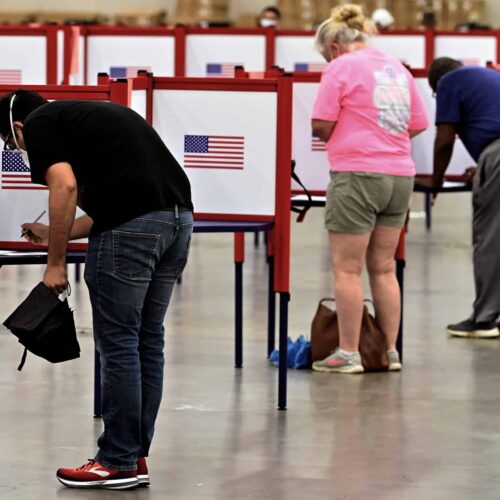Introduction
Hi Watchdogs, and welcome back to your favorite newsletter. 👋 We had three primaries this week, plus a recent one in South Carolina. We’re zooming in on Kentucky this week with reporting from some local reporters. We also have a run down on President Trump’s Tulsa, Okla., rally and its K-pop connection.
First up, South Carolina: Some of the sharpest reductions in the number of polling places — and longest lines — have come in cities that are home to many voters of color.
Case in point: Melinda Anderson, 71, from Columbia, S.C., got a robocall the night before the primary saying that her polling place had been moved. The next day, she waited in line with other disabled voters in 90-degree heat. Then, after waiting in line for more than 3 hours, she left.
“Whether my vote mattered or not, I wanted my vote to be counted. That’s what I’m worried about in November,” she said. Read our full investigation here. (Tweet this story)
She’s got a point. Are South Carolina primaries a peek into the November election? Maybe, maybe not. All these problems suggest that there will be major barriers to ballot access in November, when the coronavirus will still be around.
#AllEyesonKentucky: Yup, that was trending on Twitter on Tuesday. Local reporters and experts were on the ground separating fact from fiction, especially since election officials were expecting high voter turnout.
The Courier-Journal reports that the Bluegrass state had roughly 200 polling locations. That’s way less than the 3,700 the state has in a typical election year. This is a huge deal, especially since Jefferson County, the state’s most populated county, had only one polling location. Also worth noting: Jefferson has a large Black population, making voting for Black Americans and people of color in the state a lot harder.
WLKY reports that lines were short, however. University of Kentucky law professor Joshua A. Douglas says Jefferson has also demonstrated that most of the county’s voters requested a mail-in ballot, or voted early.
Later Tuesday evening, Charles Booker and Amy McGrath’s campaigns filed injunctions to keep the polling location open to accommodate voters, but the injunction was denied.
Related: Courier-Journal reporter Joe Sonka has a Twitter thread that shows voters struggling to get inside after the polls were set to close at 6 p.m.
The bigger picture: If you thought COVID-19 wreaked havoc on primaries, just wait until November. (via Mother Jones) Reporting on the coronavirus and primaries takes resources, but guess what? We don’t take ad money. Help us keep covering America’s most pressing issues.
We can’t do this work without your support.
You don’t know Jack: Jack Abramoff, disgraced Washington lobbyist, has been charged with a criminal conspiracy related to cryptocurrency — but this isn’t his first rodeo. He’s been working to reshape the political landscape through money and access for a very long time.
- In 2017, we reported that Ambramoff tried to schedule a meeting between Trump and the controversial president of the Republic of Congo.
- And there was also the time that Ambramoff’s firm sponsored more than a dozen congressional trips, including golfing experiences on Scotland’s historic Old Course and watching the Chitimacha Louisiana Open.
The Abramoff scandal propelled a major overhaul of ethics and lobbying disclosure laws, but there are still questions about whether some of the reforms actually did anything.
Reign supreme: Last week, we told you about the Supreme Court victories for LGTBQ+ employees and DACA recipients. But SCOTUS just ruled that asylum seekers detained near the U.S. border cannot challenge their removal. (via CNN)
📍Tulsa, Oklahoma: Trump’s return to the campaign trail after a three- month break was expected to be raucous. Campaign staffers were so confident of a high turnout that they boasted the venue’s 19,000 seats would be filled and even set up an overflow area. (via NBC News)
Only 6,200 supporters actually showed up, prompting speculation this was because of TikTokers and K-pop fans, who encouraged people on social media to sign up without planning to attend. 👀 (via Washington Post)
But that’s not the only reason the event made headlines. At the rally, Trump used the racist term “kung flu” when referencing the coronavirus. And this isn’t the first time, either. Trump and other Republican politicians have repeatedly referred to COVID-19 as the “Chinese virus.”
That has consequences. We reported that more than 30 percent of Americans have witnessed someone blaming Asian people for the coronavirus pandemic. (Tweet this link)
We’re continuing our series featuring journalists who have written powerful stories. We spoke to R.G. Dunlop about how Kentucky jailers profit from selling e-cigarettes to inmates. The Kentucky Center for Investigative Reporting piece revealed that those sales raked in more than $1.3 million in 2018. And while health concerns led to a 2014 ban on e-cigarettes in the state’s prisons, officials opposed restrictions on the use of vaping products in county jails. All in all, profits from e-cigarette sales beat out health concerns for thousands of Kentucky inmates.
1. How did you get the story? What led you to pursue it?
The story began, as many do, with a tip from a trusted source. The source raised questions about one jailer’s possible improper involvement in the e-cigarette business. But I wanted more than one isolated case of apparent wrongdoing. Was there a pattern?Just how widespread was the problem?
So I began making calls — lots of calls, dozens of calls, probably several hundred calls— to people around the state. And while many of those calls yielded little or nothing, as is often the case, I did eventually gather and corroborate enough information to produce what we published and aired. We ended up with stories that raised questions about seven or eight jailers and jail officials, not just the initial, lone example, and those stories delved into issues that went well beyond the original tipster’s allegations.
The stories intrigued me because I have written about other issues pertaining to jailers and have long believed that they deserve much more critical scrutiny than they typically receive from the public, or from public officials.
2. What were the challenges of reporting and how did you navigate them? Where do you look for inspiration? Or your favorite investigative story?
The challenges of reporting the stories are not unlike those raised by most other investigative efforts: finding credible sources who are willing to talk publicly and/or direct the reporter to documents that support allegations, as well as finding useful documents on my own; making good-faith efforts to contact and interview those officials about whom questions were being raised.
Navigating these challenges was pretty much the norm in investigative reporting: keep pushing, keep pushing, keep pushing, not only on weekdays but also, if necessary, at night and on weekends. Calling, calling and calling again, emailing, emailing and emailing again. Once I was asked to stop communicating, I always complied. But getting no answer at all simply encouraged me to keep trying.
Inspiration for investigative reporting is pretty much ingrained, in my opinion. For me, it has long been my passion.
Takeaway: Always keep pushing.
📖 What we’re reading:
- Minneapolis has a bold new plan to tackle racial inequality and climate change. Could it actually work? (via NPR)
- Pregnant women exposed to high temperatures or air pollution are more likely to have children who are premature, underweight or stillborn. African American mothers and babies are at a higher risk. (via New York Times)
- A Mississippi mayor was moved to tears as he issued a historic executive order to remove the state’s flag — which features the Confederate battle emblem — from government properties. (via Newsweek)
That’s all for this week, folks. Have you been hearing fireworks going off in your neighborhood lately? Twitter has some theories about that. See you next week.
Read more in Inside Public Integrity
Watchdog newsletter
Words matter: Was the attack on the Capitol a rally, protest or insurrection?
The question remains how history will record the events that resulted in mayhem at the U.S. Capitol.



Join the conversation
Show Comments